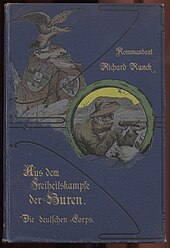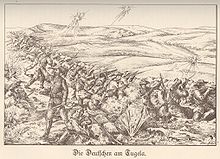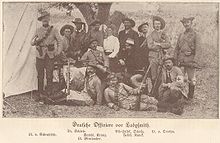Richard Runck
Richard August Runck (born April 29, 1868 in Hermersberg ; † February 9, 1922 in Rhodt ), leader of a German volunteer corps in the Boer War , district chief (equivalent to a district administrator or district administrator) in Warmbad , German South West Africa , today Namibia , captain in First World War .
Life
Richard Runck was born as the son of the Protestant pastor Heinrich Wilhelm Justus Runck (1833–1899, from Nünschweiler ) in Hermersberg, West Palatinate, and grew up in Homburg until 1880 , then in Rechtenbach . From 1886 Richard lived with his family in Rhodt . He showed musical and artistic talent. His father wrote books on local history and his uncle Jakob Serr achieved fame as a local painter in Rhodt . Richard Runck was an adventurer and did not even complete his studies after school. Even before the state examination he ran away to North Africa, where he a. a. got to know a completely different world in Cairo . He wrote about it later. He then went to the Transvaal in South Africa. Here he became a big game hunter , served in the police force and voluntarily took part in the fight against locals. When the Second Boer War broke out, he also volunteered to defend the country against the British. In his memoirs “From the Boers' struggle for freedom”, Runck reports: “The turmoil of war also tore me from my peaceful sphere of activity in the Pienaars district. I said goodbye to my friends and went out, accompanied by their sincere wishes for a happy, healthy return. ”The man from Palatinate initially served as a field cornet for the German command group Pretoria , but soon surpassed commandant Paul Krantz, who feared Runck's popularity. He arranged for his replacement and Richard Runck finally gathered men around himself and led his own German corps. In the summer of 1900, he was taken prisoner by the British near Johannesburg and transferred to a camp in Ceylon . Runck also reports on this in his memoirs that he felt “dirty” there, mistreatment and hunger were the order of the day. The illustrated Sunday supplement "Zeitbilder", the "Pfälzer Presse", Kaiserslautern , reported in its issue no. 33 of August 18, 1900 that Richard Runck was "a few weeks ago in a battle off Johannesburg" and four of his men were taken prisoner by the English, but according to a handwritten card message to his family, he was doing well. Attached is the photo in civilian clothes posted here, which - like the information - apparently came from the family living in the Palatinate .
After the end of the Boer War, Runck was released and returned to Germany. In 1902 he wrote in Rhodt , where the recently deceased father was last as prot. Pastor had officiated, his memory book "From the freedom struggle of the Boers - The German Corps" . The adventurer apparently also presented this book in his closer home. In the Grünstadter Zeitung of December 9, 1903 it says in this regard:
“ The local antiquity association has also included historical lectures in its program. On the next Sunday, Mr. Richard Runck, former commandant in the army of the South African Republic, leader of the German Corps, a native of the Palatinate, will give a lecture on the Boers' struggle for freedom in the Saale der Jacobslust. We all still have fond memories of those months in which the changing news from the theater of war was awaited with great tension. Mr. Runck made himself famous for an excellent work on the Boer War. He is the son of the late pastor Runck, in Rhodt near Edenkoben. "
Richard Runck went back to Africa during the Herero uprising . On December 4, 1904, he was seriously wounded by spears not far from Naris. In recognition of his efforts in the suppression of the uprising, the man from Palatinate advanced to the position of district chief (= district administrator) of Warmbad, in the colony of German South West Africa (now Namibia ). Here he married, was a successful rancher and a respected judge. In 1914 he went home with his wife for the first time to introduce them there. They were arriving just as the mobilization for World War I was announced and Richard Runck had to move in immediately. In Ypres again severely wounded, he received on 30 July 1918. Soissons , as a captain, for his bravery, a commendation from the commanding general. Shortly before the end of the war, Richard Runck was taken prisoner by the French, which lasted 1½ years and caused permanent physical damage. As the last soldier in the village of Rhodt, he returned seriously ill and soon died, only 54 years old. His brother Heinrich Runck was chief magistrate in Öttingen .
literature
- Report on the arrest (with curriculum vitae and photo) in: "Zeitbilder", Sunday supplement of the "Pfälzer Presse", Kaiserslautern , No. 33 of August 18, 1900
- Viktor Carl: Lexicon of Palatinate personalities . Hennig Verlag, Edenkoben. 1998. p. 588
Web links
- English website of the "South African Military History Society" The site deals with the German corps in the Boer War; Richard Runck is mentioned several times in the section "Unity of the Germans threatened".
Individual evidence
- ^ University of Frankfurt : Declaration of district chief. In: German Colonial Lexicon (1920)
| personal data | |
|---|---|
| SURNAME | Runck, Richard |
| ALTERNATIVE NAMES | Runck, Richard August |
| BRIEF DESCRIPTION | Commander of a German corps in the Boer War, district chief in German South West Africa |
| DATE OF BIRTH | April 29, 1868 |
| PLACE OF BIRTH | Hermersberg |
| DATE OF DEATH | February 9, 1922 |
| Place of death | Rhodt under Rietburg |




